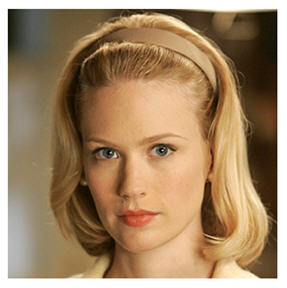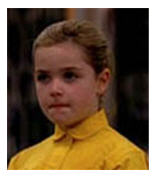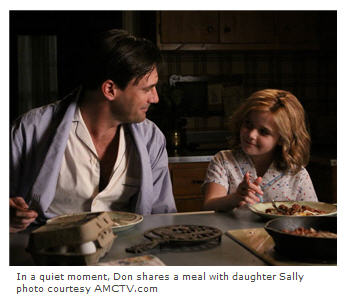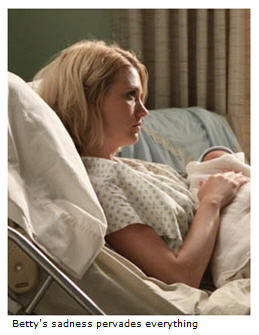 Disturbing, on oh-so-many levels.
Disturbing, on oh-so-many levels.
This week’s episode of Mad Men was an unsettling and somber look at the world of baby-birthing in the 60s, and long before.
Setting aside all your opinions of the main character’s ambivalence about her place in society, her marriage, her family and her unborn child, it’s hard not to be struck by the sterile dispatch of hubby to the waiting room, and mommy-to-be, to Nurse Ratchet with Demarol.
We’re served up a chilling reminder that the childbirth choices we take for granted haven’t been around for that long.
The preliminaries
“Your job’s done,” says the steely-edged nurse, wheeling off a weary Betty who is in labor, and pointing Don to the Solarium, who stands for a moment with his hat in his hands. It is a position that is uncharacteristic of him – powerlessness. He’s cut out of the loop entirely, and can only wait. As for Betty? Her ordeal is just beginning, though it’s one she’s more or less accepting of, and familiar with.
“Are you planning to give the baby the breast?” the nurse asks briskly, filling out a form.
“No,” replies Betty, between contractions.
No. And no arguments from anyone. That was one of the few choices that women had at the time. (Ironically, in the past two decades, it’s one that pro-breastfeeding bullies have tried to eliminate.)
Birthing and parenting – through a fog
Aptly titled “The Fog,” this episode walks us into a world simmering with anxiety and denial. There is no joy evident in the anticipation of this baby, nor in its birth.
Not only is Betty drugged for the actual event (several of the scenes are hard for this mother to watch), but the fog pertains to more than the drugged state in which lovely Betty finds herself. Surely it is her inability to clearly view the behavior of the children she already parents. Daughter Sally is acting out in school, the result of grieving the loss of her grandfather (who paid a bit of attention to the child). She seems to suffer – like many children of the era – from benign (emotional) neglect. 
Betty’s initial response to her daughter’s scuffle with another child at school is to mention the other girl’s heft: “Sally told me she’s a bruiser.”
Betty’s reaction to her daughter’s bad behavior neatly wreaks of sixties prejudice against anyone who doesn’t fit a certain mold. You could also chalk it up to being on the verge of giving birth, except that this is Betty’s habitual behavior when it comes to her children. As for Don, he not only seems aware; he seems concerned, but the primary focus of his concern lately is on his wife.
More fun in the land of drugged debs?
There are wry and tragic lines like “Breathe and think about the beauty parlor,” from the duty nurse who shoves a needle roughly into Betty’s arm, and understandable objections as Betty discovers that her doctor is out to dinner and she’s at the mercy of whomever is on call (some things never change). There’s a disturbing scene as Betty fights and flails about during labor, screaming for her husband, only to be drugged unconscious into a dream state. There, we sleepwalk at first blissfully with our much conflicted heroine, as she wanders suburbia in a floral dress, subsequently encountering her dead parents who dish out a talking to.
For any woman who has given birth in the past 25 years, these images of hospital rooms and indifferent medical staff are more than a little creepy. Betty’s wishes are irrelevant, during a time when women were slotted into very specific roles – simultaneously admired and ignored – but expected to tow the line.
Is my feminism showing? Excellent!
Then I shall daintily climb onto my soapbox, gingerly balance in my strappy sandals, and point out that feminism is not a dirty word. For some, it conjures images of “radical” women in the 70s – a time when there were various radical movements in our country, shaking the foundations of our society. As for feminism, it could do with a bit of good PR and some quality “rebranding,” as the term doesn’t do justice to battles fought and won, battles fought and still just beginning, and the overwhelming messiness that resulted.
What do I mean by that?
Gender confusion and unrealistic expectations on all sides, one constrained set of “shoulds” for women and men, that should have allowed for more choices, not fewer, and not an overly ambitious (and naive) Superwoman myth of “bringing home the bacon and frying it up in the pan.”
Great in theory? Sure! And workable if you have money, help, and preferably a partner who also has money and help. And the individual dynamics that make sense for each couple?
Ah, the wisdom of hindsight. It’s a discussion for another day, and no doubt a heated one. But at the very least, any viewer of Mad Men can see the loneliness, imposed limitations, and despair in a woman like Betty. In her drug induced state, even her dead parents – who seem to talk at her rather than to or with her – point out that she should be happy; after all, she’s “important” and she “has little to do.” They dismiss her, the person she is, or could be.
More good stuff
As usual, there are many other nuances in this week’s episode that beg for discussion. Among them:
- Sal’s mannerisms in the expense accounting meeting are noticeably more “dandy-like”
- Peggy approaches a professional crossroad at the hands of Duck, or is it a trap?
- Pete smartly tries to incorporate the realities of integration and “negro purchasing power” into an ad campaign, as awareness builds that times, they are a-changing

As for Don? The waiting room scene presents a brief bonding with a prison guard anticipating the birth of his first baby. The two swap a few tales, share a bottle of whiskey, and cigarettes. In one poignant exchange about the two Draper children, Don mentions Sally, and the other father-to-be asks:
“The other one a boy?”
“Yes,” says Don.
“You throw the ball around?”
Don hesitates. “Not enough,” he answers.
 As the guard receives good news that he can visit his newborn, he vows to become a better man. Ironically, he now comforts Don as his wait continues, and says to him as he leaves: “You’re an honest man, and believe me, I know.”
As the guard receives good news that he can visit his newborn, he vows to become a better man. Ironically, he now comforts Don as his wait continues, and says to him as he leaves: “You’re an honest man, and believe me, I know.”
Ironic, too, that it is Don who shares a tender moment with his daughter that night. And Betty, still in a fog, who cannot yet seem to manufacture any joy in the birth of her third child.
This particular episode?
It is indeed all about the fog.
And all about women and a country on the verge of that fog lifting. The hard way.
Images courtesy AMCTV.com. Read more Mad Men musings and recaps.
© D A Wolf
I loved when Don said to the other expecting father, quoting what Betty’s nurse said during Sally’s birth: “Your wife’s on a boat. You’re on the shore.”